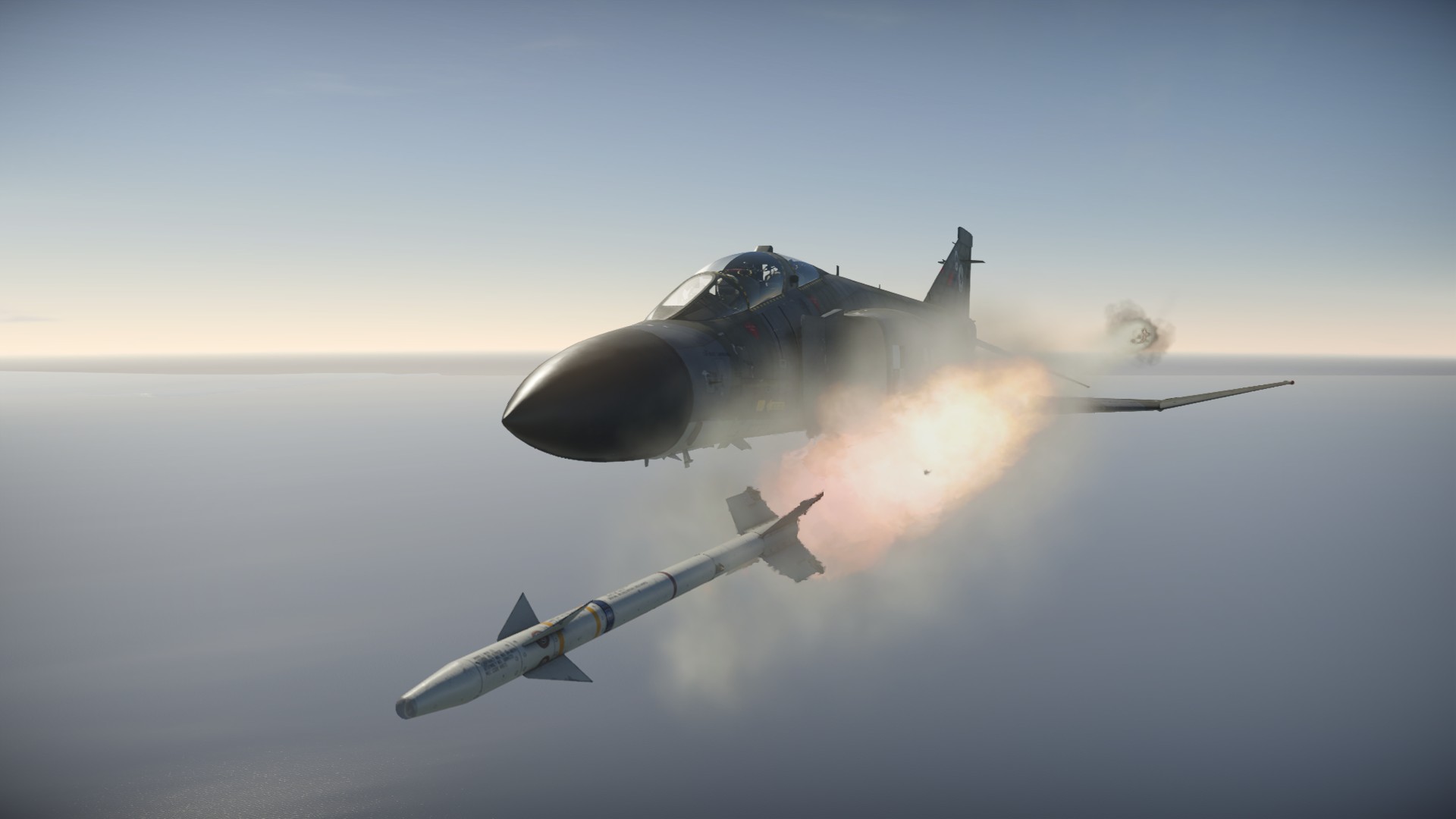AIM-9D Sidewinder
Contents
Description
The AIM-9D is an American Infrared homing air-to-air missile, it was introduced in Update 1.93 "Shark Attack", along with the Phantom FGR.2 (the only aircraft which currently carries it).
Vehicles equipped with this weapon
General info
The AIM-9D is a member of the Sidewinder family of missiles, it incorporates a number of improvements over the AIM-9B, from which it was developed. It should be noted that the AIM-9E was also a development of the AIM-9B rather than the AIM-9D; while the AIM-9D was developed for the US Navy, the AIM-9E was a separate development for the US Air Force. In game the AIM-9D is generally similar to the AIM-9E, but there are distinct differences between the two.
The AIM-9D has the best effective range of any missile currently found on fixed wing aircraft in the game.
Effective damage
Like the AIM-9B & AIM-9E Sidewinders the AIM-9D is fitted with a 4.5 kg TNT warhead and 5 m proximity fuse. This amount of explosive mass is in the vast majority of cases enough to either outright destroy an enemy aircraft or cause non-survivable critical damage; however there are some occasions where an enemy aircraft can survive a hit and make it back to base.
Comparison with analogues
Compared to other Sidewinders
The AIM-9D is a substantial improvement over the AIM-9B. The key improvements are:
- More effective fins
- Overload of 16 G instead of 10 G
- Rocket motor burns for 3.5 instead of 2.1 seconds
- Max speed of 1,000 m/s instead of 800 m/s
- Has an uncaged seeker
- Better IR seeker range
- Seeker gimbal limit of 40° instead of 25°
- Better tracking rate
These changes make the AIM-9D a far superior all round missile. The uncaged seeker makes maintaining a lock prior to launch much easier and allows you to lead the missile. Once the missile is launched it tracks targets much better than the AIM-9B and has far superior speed and range.
The AIM-9D is very similar to the AIM-9E, with the following key differences:
- More effective fins
- Overload of 16 G instead of 10 G
- Rocket motor burns for 3.5 instead of 2.1 seconds
- Max speed of 1,000 m/s instead of 800 m/s
The increased overload and improved fins mean the AIM-9D can track targets better than the AIM-9E. The other changes mean that the AIM-9D has a far superior effective range than the AIM-9E. While both missiles can theoretically fly 18,000 m from their point of launch; the AIM-9D's much longer burning motor and higher maximum speed means that it holds it's speed much better at longer ranges and can remain effective at ranges where the AIM-9E would have lost too much speed to do so. It is not uncommon for AIM-9Ds to be able to hit targets in excess of 5 - 6 km from their point of launch (an even in excess of 7 km some times). However unlike the AIM-9E the AIM-9D cannot be slaved to an aircraft's radar.
Compared to other missiles
Compared to the R-60 the AIM-9D is a very different missile with a different play style. The R-60 has more effective fins than the AIM-9D, a higher maximum overload, and a much higher tracking rate (more than double that of the AIM-9D). All this makes the R-60 a far superior weapon for short range engagements against manoeuvring targets. However the AIM-9D excels at longer range engagements, being able to engage targets at ranges far beyond what the R-60 could ever hope to, even in ideal conditions. Under ideal conditions the R-60 has a maximum engagement range of around 3.5 km, however in combat the effective range is usually less than 2.5 km; by comparison under combat conditions the AIM-9D routinely take out targets at ranges in excess of 5 km, with even kills on targets as far away as 9 km having been observed in combat. The rocket motor on the R-60 burns for 0.5 seconds less than the AIM-9D, while also producing less than half the thrust, which coupled with it's lower top speed and much lower flight time and flight distance limits severely restrict it's range.
The incredible range of the R-60 is what distinguishes it from other air to air missiles in the game. It is also among the more manoeuvrable missiles currently available to jet aircraft.
Usage in battles
The AIM-9D is a radical departure from the SRAAM you will have grown accustomed to while playing the Hunter F.6; the SRAAM has far superior manoeuvrability and maximum effective range of an SRAAM is comparable to the bare minimum range you want to be using the AIM-9D at. The AIM-9D is not built for very short range combat; most of the time the missile will not hit it's target when fired from within 1 km, the missile needs to gain speed for the fins to become fully effective, by which point it has usually overtaken its target when fired from this range.
Where the AIM-9D truly excels is in longer range engagements. Ideally you should fire the AIM-9D at a target 2 km or more away from you, and if the target is manoeuvring you should use the uncaged seeker to "lead" the missile (although this starts becoming less important at longer ranges. The AIM-9D has a stated maximum locking distance of 5 km; in practice this means that from the rear you can lock on to most non-afterburning jets at about 4.5 km; however as afterburners produce a lot of heat you can lock on to an afterburning jet as far away as 10 km (and possibly even hit them to).
When engaging a target with the AIM-9D further really is better (to an extent). The more distance the missile has, the better it is able to follow a flight path leading it to the target, and the more likely it is that the enemy will be unaware of your presence. You can routinely engage afterburning targets located 5 - 7 km away from you with the AIM-9D; and although kills at 9 km have been observed you are probably "trying your luck" by the time you get to those sorts of ranges.
At very short ranges (typically a bit less than 1,000 m) the AIM-9D can lock on to an afterburning jet from the front, while this is usually of little use (it cannot really manoeuvre at that sort of range and angle of attack), it can be useful in head-on attacks.
Pros and cons
Pros:
- Good range, can hit targets up to 4 km away from you
- Slightly more powerful and much longer burning (2.1 vs 3.5 seconds) rocket motor than the AIM-9E
- Has uncaged seeker and good seeker gimbal limits
- Has a very good 16 G overload
Cons:
- Cannot be slaved to the radar
- Has a much lower tracking rate than the R-60, making it less effective at tracking targets in comparison
History
Examine the history of the creation and combat usage of the weapon in more detail than in the introduction. If the historical reference turns out to be too long, take it to a separate article, taking a link to the article about the weapon and adding a block "/History" (example: https://wiki.warthunder.com/(Weapon-name)/History) and add a link to it here using the main template. Be sure to reference text and sources by using <ref></ref>, as well as adding them at the end of the article with <references />.
Media
An excellent addition to the article would be a video guide, as well as screenshots from the game and photos.
See also
Links to the articles on the War Thunder Wiki that you think will be useful for the reader, for example:
- reference to the article about the variant of the weapon;
- references to approximate analogues by other nations and research trees.
External links
Paste links to sources and external resources, such as:
- topic on the official game forum;
- encyclopedia page on the weapon;
- other literature.





